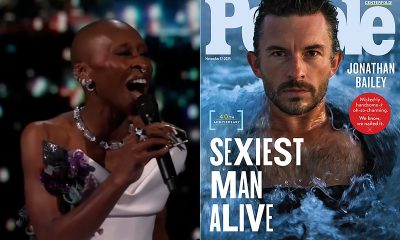Arts & Entertainment
Margaret Cho on ‘Fire Island’ and the state of stand-up
‘We laughed every day’ making new film
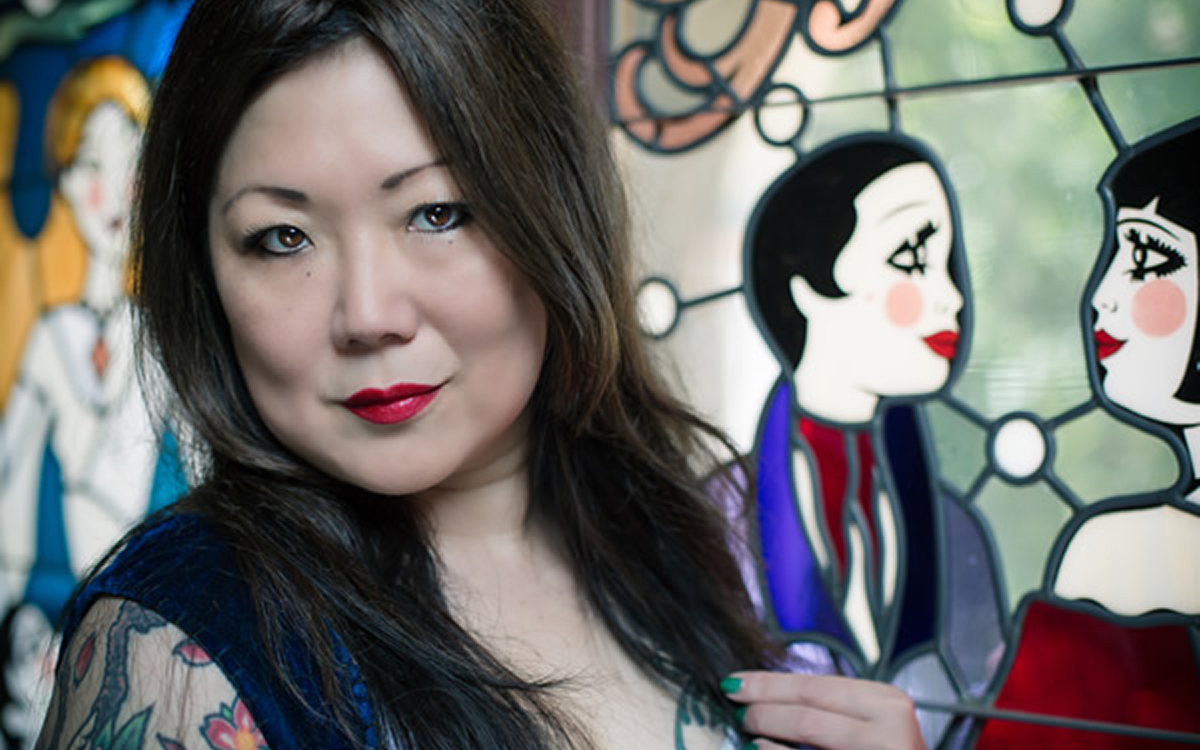
Could there be an Emmy Award in Margaret Cho’s future? In Hulu’s “Fire Island”(premiering June 3), as well as on HBO Max’s “The Flight Attendant,” Cho’s uncharacteristic restraint gives her queer characters, Erin and Utada respectively, an admirable depth and humanity. Additionally, Cho has an upcoming appearance on the Emmy Award-winning “Hacks”(as herself), and ongoing guest-starring roles in a multitude of popular shows. Never one to sit idle, Cho will be taking her stage act on the road throughout the coming months. Busy as she is, Margaret was gracious enough to make time to answer a few questions.
BLADE: Margaret, in the new movie “Fire Island,” you play Erin, who’s described by one of the characters as a “career brunch server, age unknown, lesbian queen.” What was it about Erin that spoke to you and made you want to portray her?
MARGARET CHO: I just love the script. I’m a big fan of Joel Kim Booster, and his comedy and his writing, and as a person. I wanted to be a part of the film. I love Andrew Ahn’s direction. I love Bowen (Yang). It was really special to do this. The “career brunch server” was so appealing. Everything about this character is a lot of fun, and so it was just perfect. We had a blast doing it.
BLADE: It looks that way! Erin is the wise lesbian housemother to her gaggle of younger gays. Is this an aspect of your personality that also transfers to your off-screen life?
CHO: Absolutely! The elder gay. The crone. It’s also the old lesbian who’s burned all of her bridges with the current lesbians her age and has to mine the younger generation for friendship. It’s very fun, it’s really cold, and it’s very realistic to me.
BLADE: What was the best part for you about acting with rising comic actors such as Bowen and Joel, whom you mentioned, as well as Matt Rogers?
CHO: We laughed every day. We had such a good time. Outside of my dressing room, every day, there were full-on reenactments of entire “Real Housewives” episodes. Full Tiffany Pollard monologues from “I Love New York.” It was like Shakespeare in the Park, but it was “Real Housewives” by the trailer. It was exciting. I just love those guys.
BLADE: Erin was able to afford to purchase the Fire Island house following winning a settlement involving a piece of glass and a major Italian chain restaurant. Do you think our current culture is more litigious than necessary?
CHO: I don’t know. I think the character is just really savvy and knows where to make an opportunity for herself. I think that’s really more it. I don’t know if it was necessarily because of the culture or the time or whatever. But I think that she’s just smart about doing what she can to get something.
BLADE: Was your first trip to Fire Island as a performer or as a vacationing guest?
CHO: Every trip I’ve made there was as a performer and then I stayed for vacation. So, I made it work and pleasure, both at the same time. I’ve been going there since 2008. I love spending time there and just hanging out. I’m actually more of a Provincetown lady. I’ve been going to Provincetown since the 1980s to work and perform and just hang out. These are very much important areas for me. It’s the gay beach life that I really love.
BLADE: You mentioned Andrew Ahn, the gay filmmaker who directed “Fire Island,” and he also directed the lauded 2019 film “Driveways.” Is he a director you could see yourself working with again?
CHO: Absolutely! I love Andrew. I think he’s quite an incredible director. Not only is he so great with actors…the way that he creates films is so visually stunning and they’re so emotionally rich. I really admire him and his vision as an auteur. I would love to work with him again.
BLADE: You were one of the performers in the line-up for the LGBTQ comedy show “Stand Out,” which was part of Netflix is a Joke: The Festival. Stand-up comedy has received increased attention with Jerrod Carmichael coming out as gay in his HBO Max comedy special “Rothaniel,” as well as the controversy surrounding Dave Chappelle’s Netflix comedy special. As a performer whose roots are in stand-up comedy, do you think there’s the possibility of healing?
CHO: Yes, I think so. We need to hear from LGBTQIA voices in comedy. I think that queer comedy has always been a part of the larger comedy world. We’ve always had a very strong presence within comedy. I see so many more of us participating and out there in this conversation. I was glad to be part of the festival and I’m so grateful to be part of the queer comedy community.
BLADE: Finally, I live in Fort Lauderdale, and I noticed that Florida is not on your tour schedule. I know that I’ve seen you perform in West Palm Beach, Miami, and, more recently, in Fort Lauderdale. With the political climate being what it is under the current governor, do you foresee performing here at any point in the near future?
CHO: Yes, definitely. I think it’s important to be out there. I was actually just there a few weeks ago, so. I think that we need to be constantly out there and we definitely need to be heard. Yes, I’m sure I’ll be returning again soon.
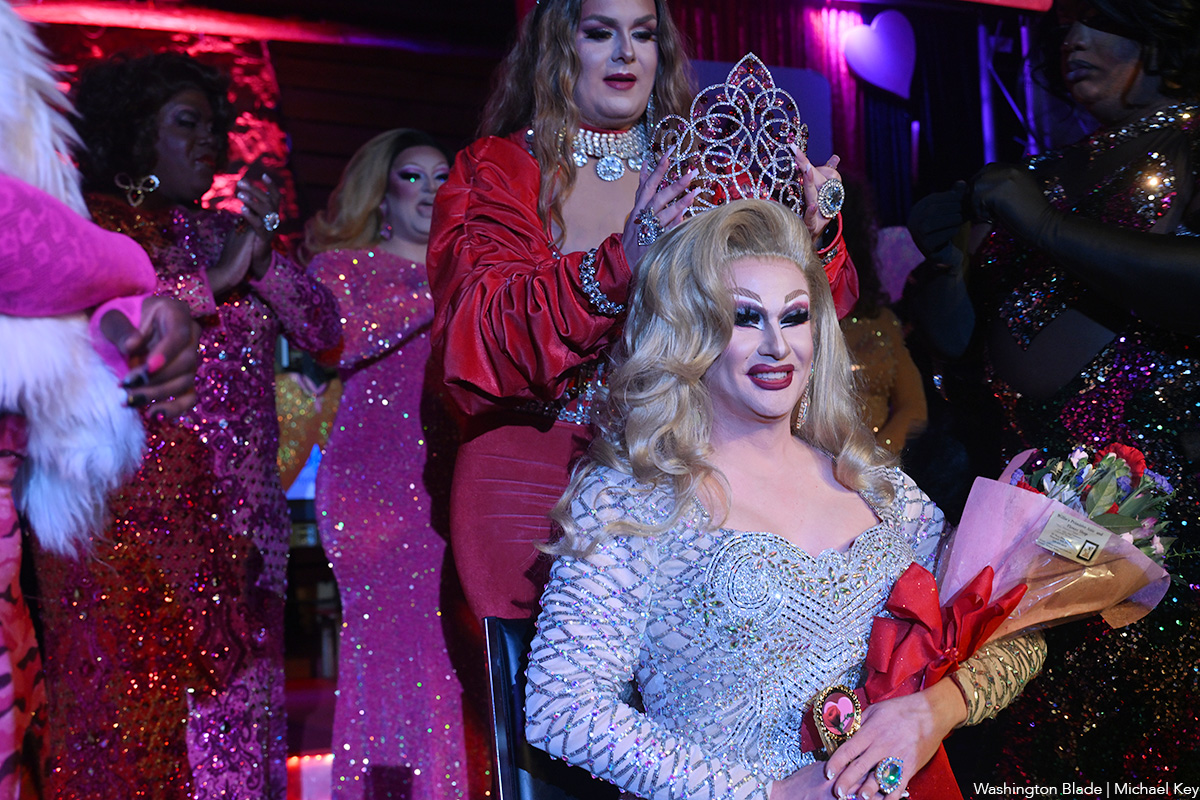
The 44th annual Queen of Hearts pageant was held at The Lodge in Boonsboro, Md. on Friday, Feb. 20. Six contestants vied for the title and Bev was crowned the winner.
(Washington Blade photos by Michael Key)
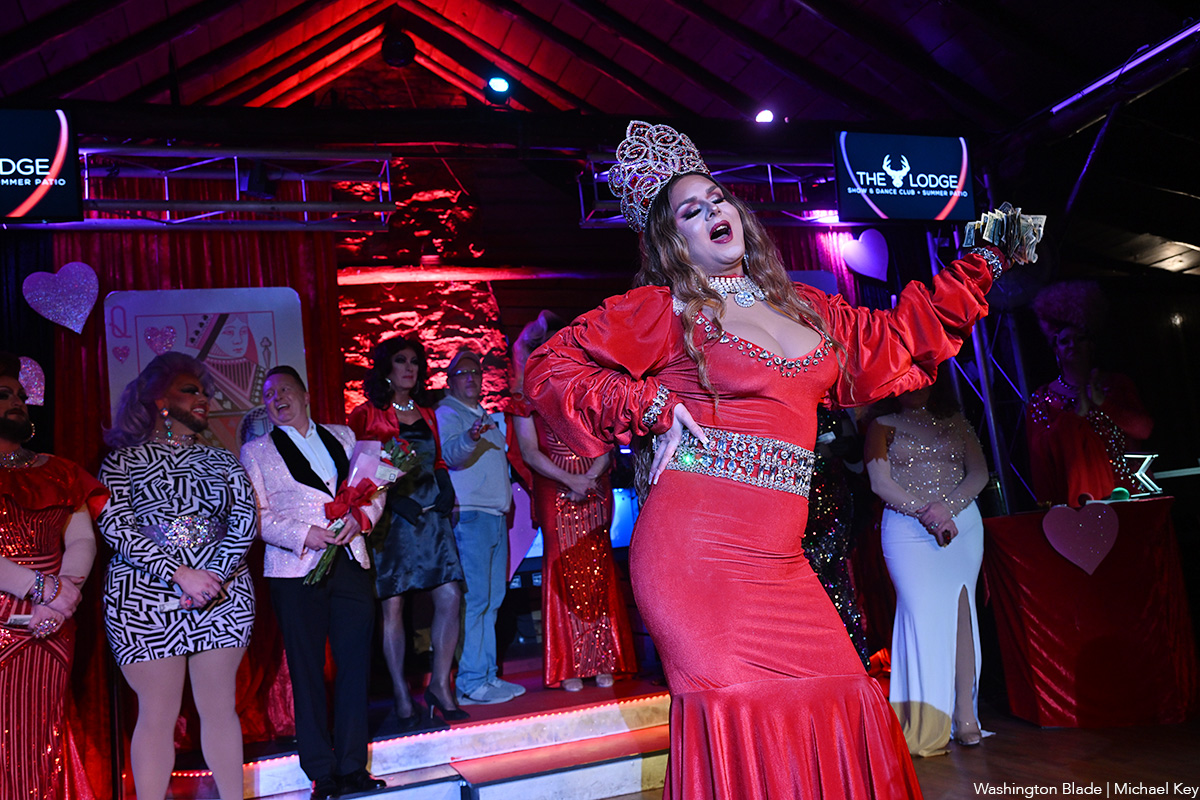
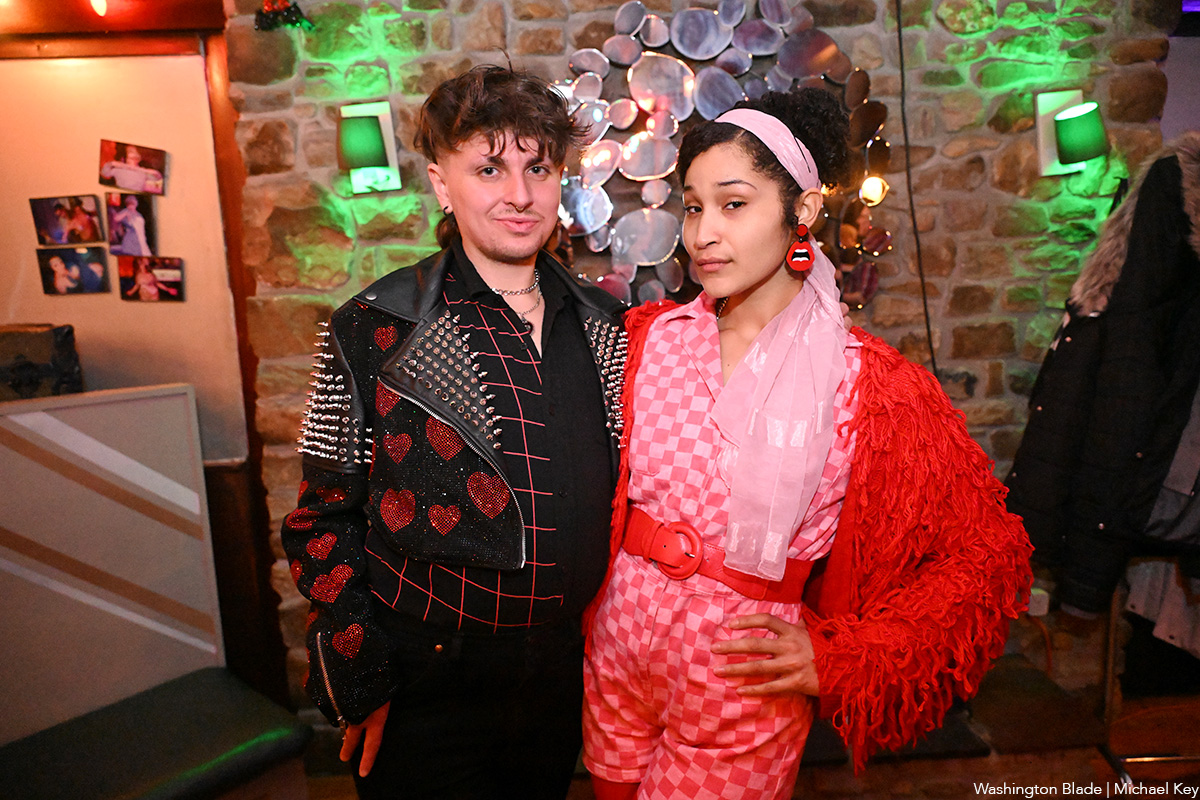
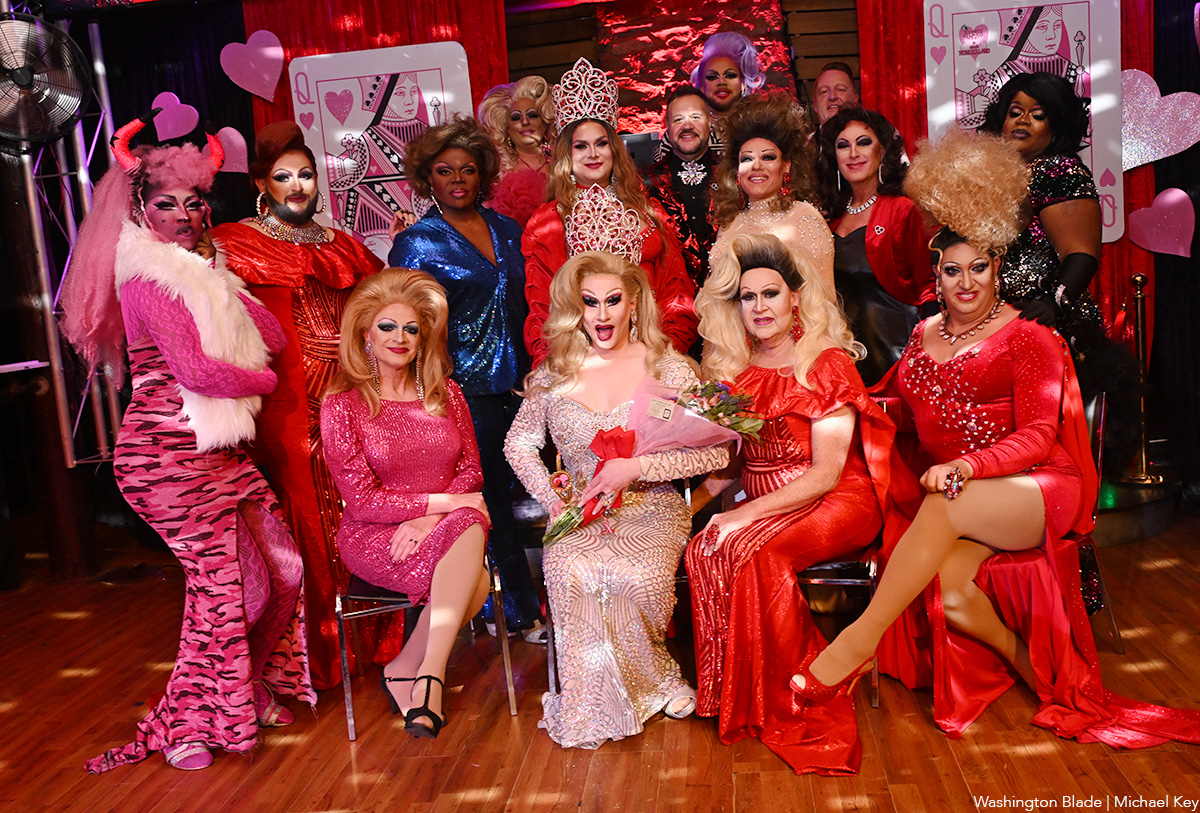
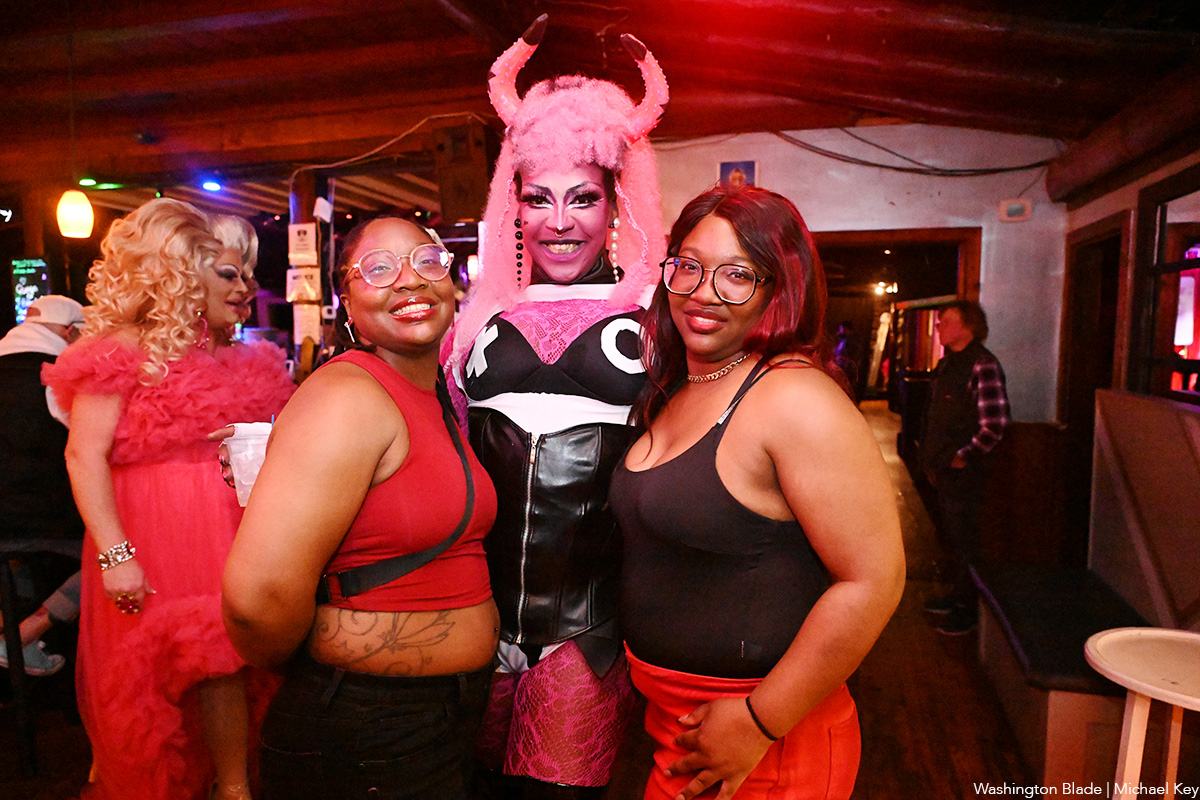
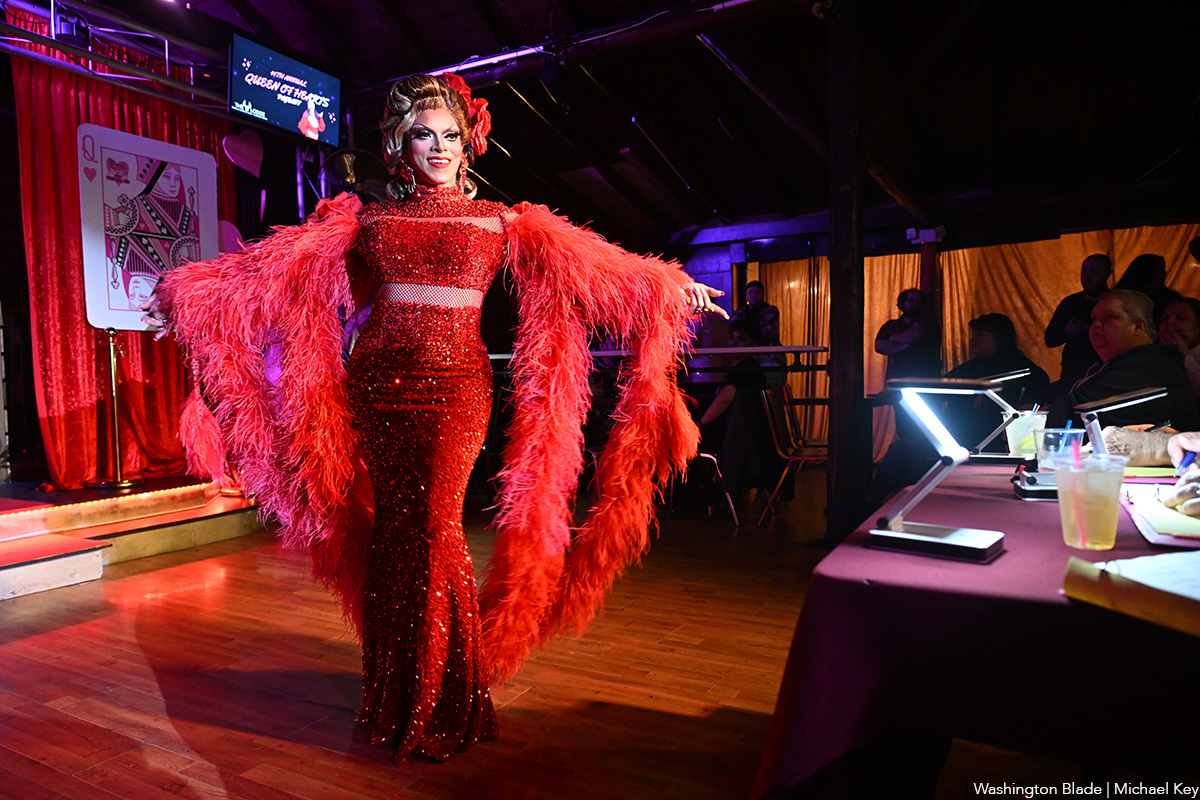
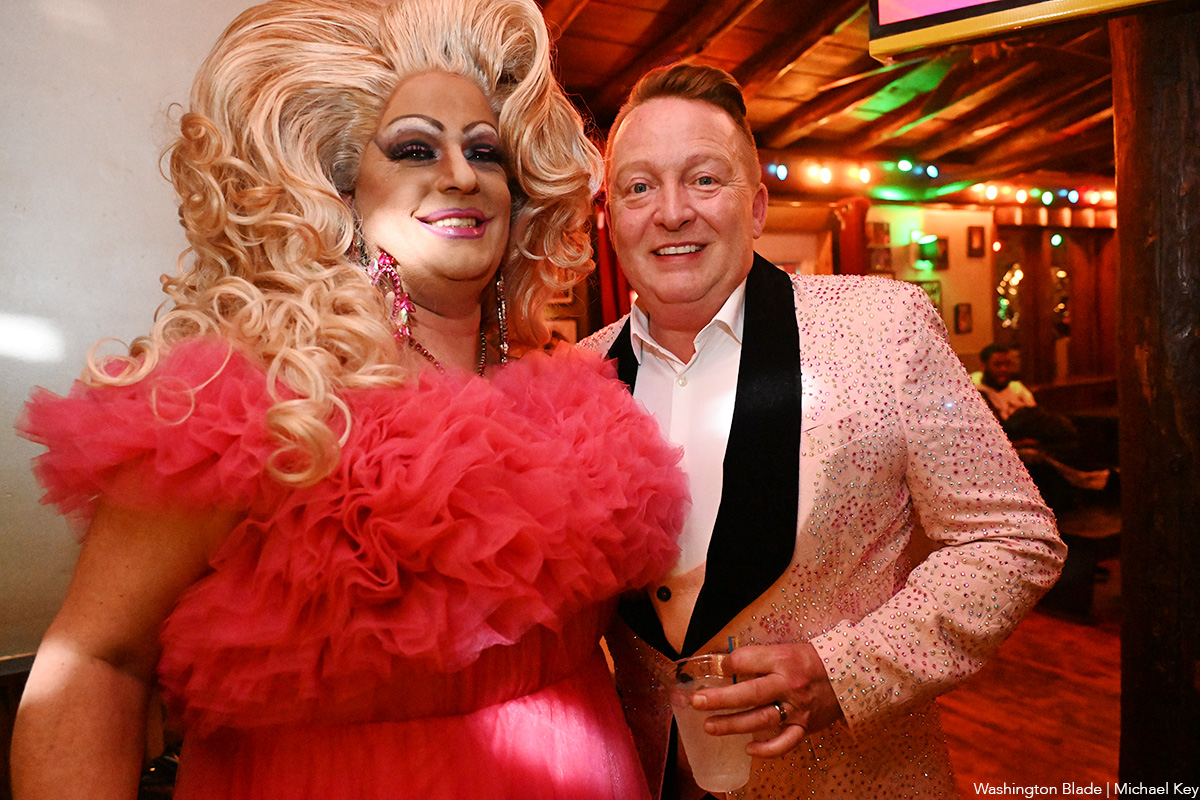
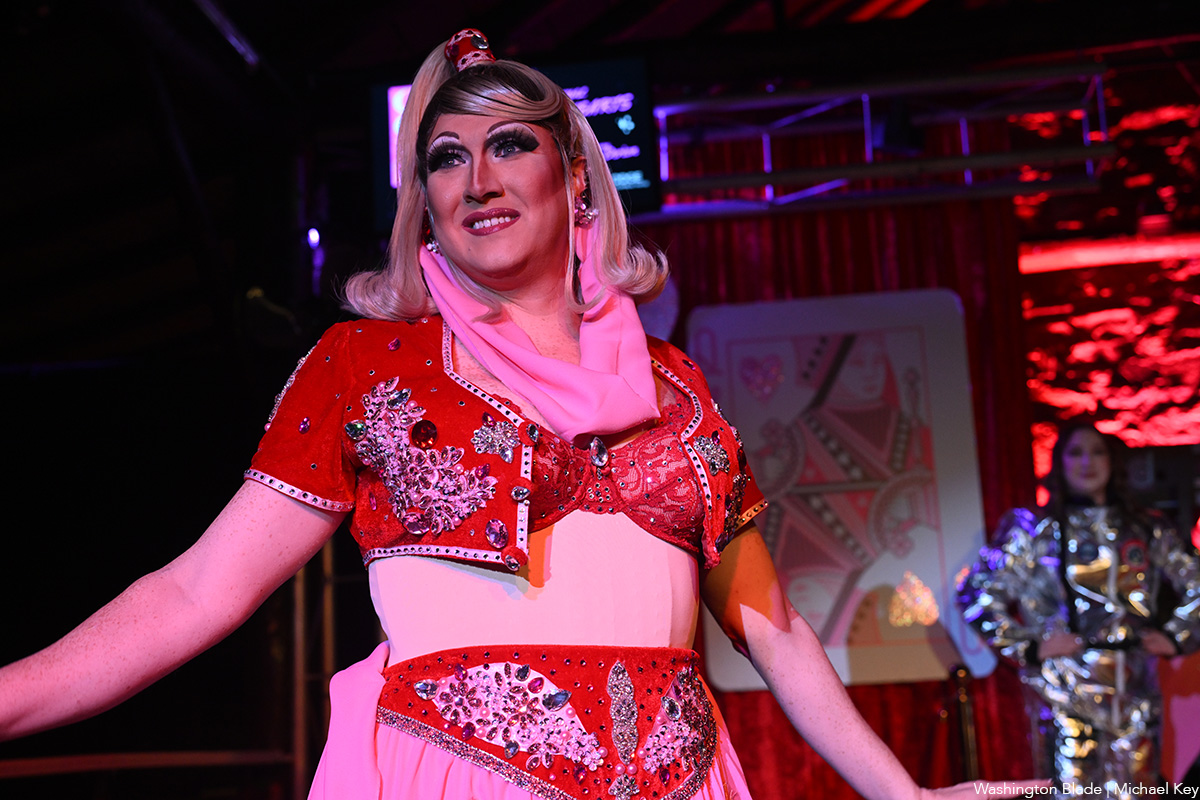
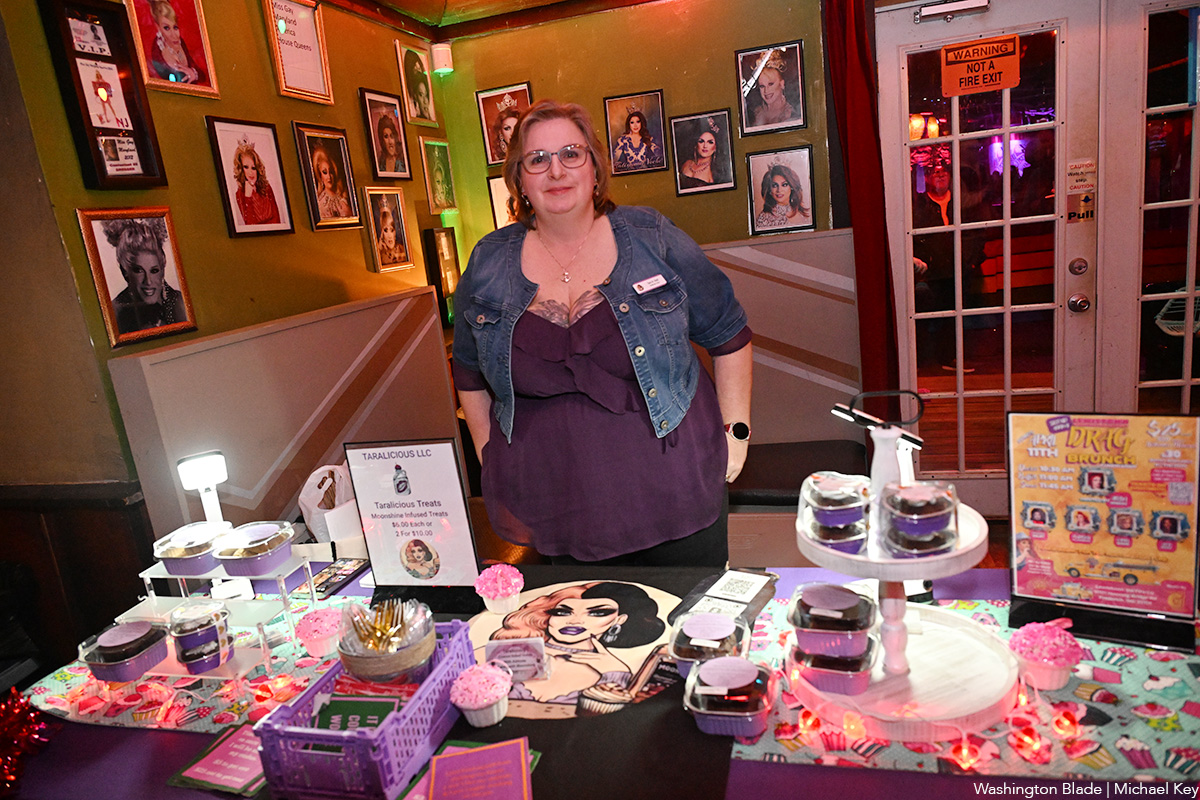
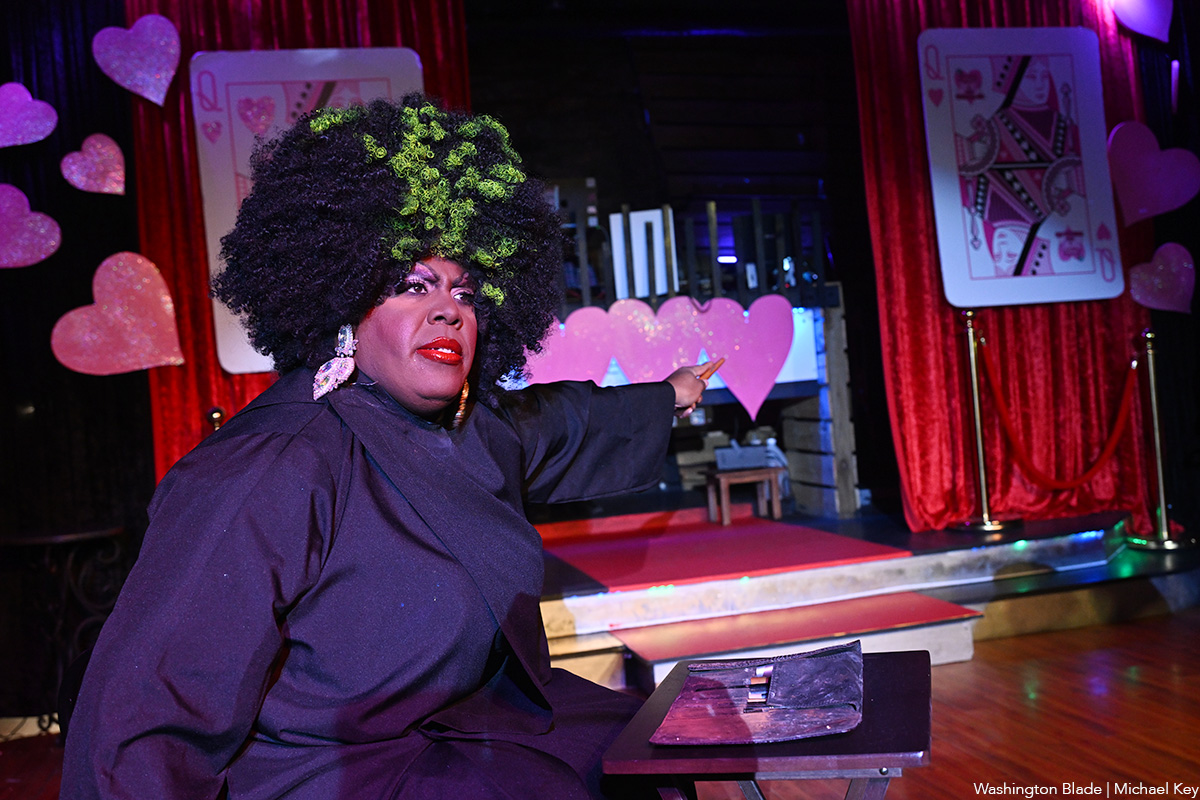
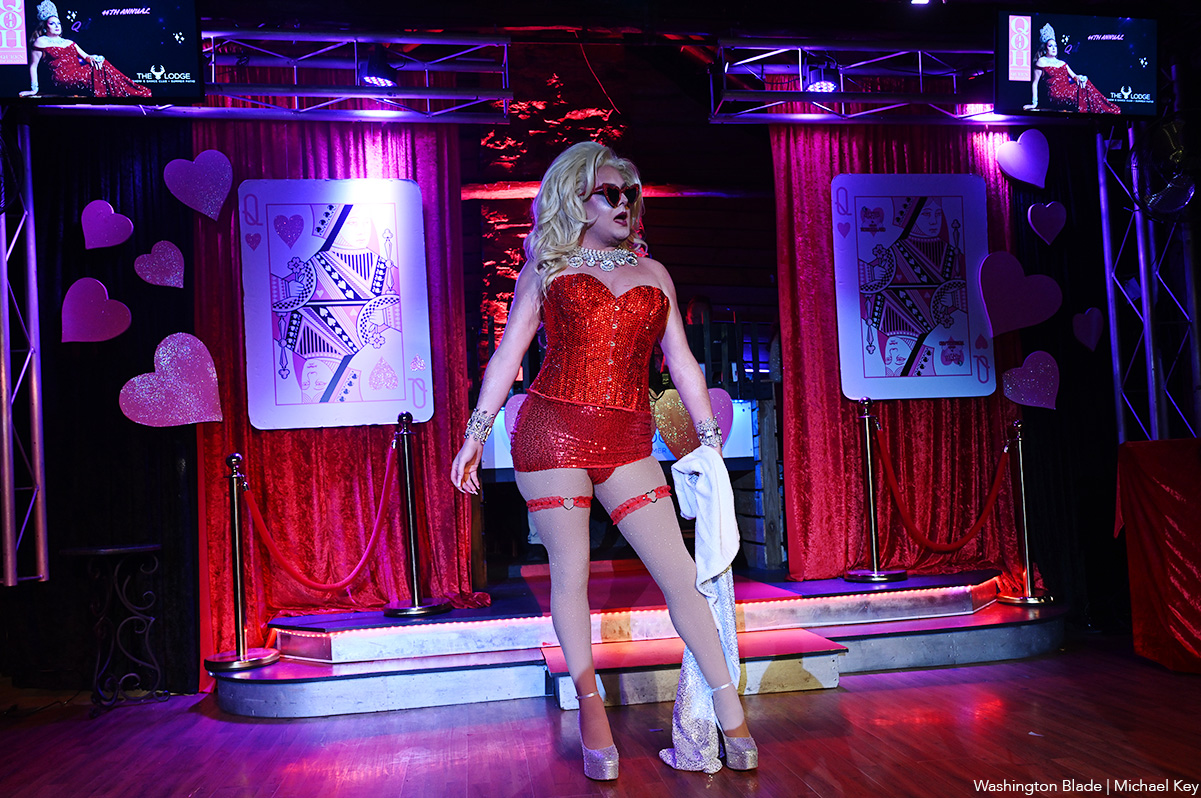
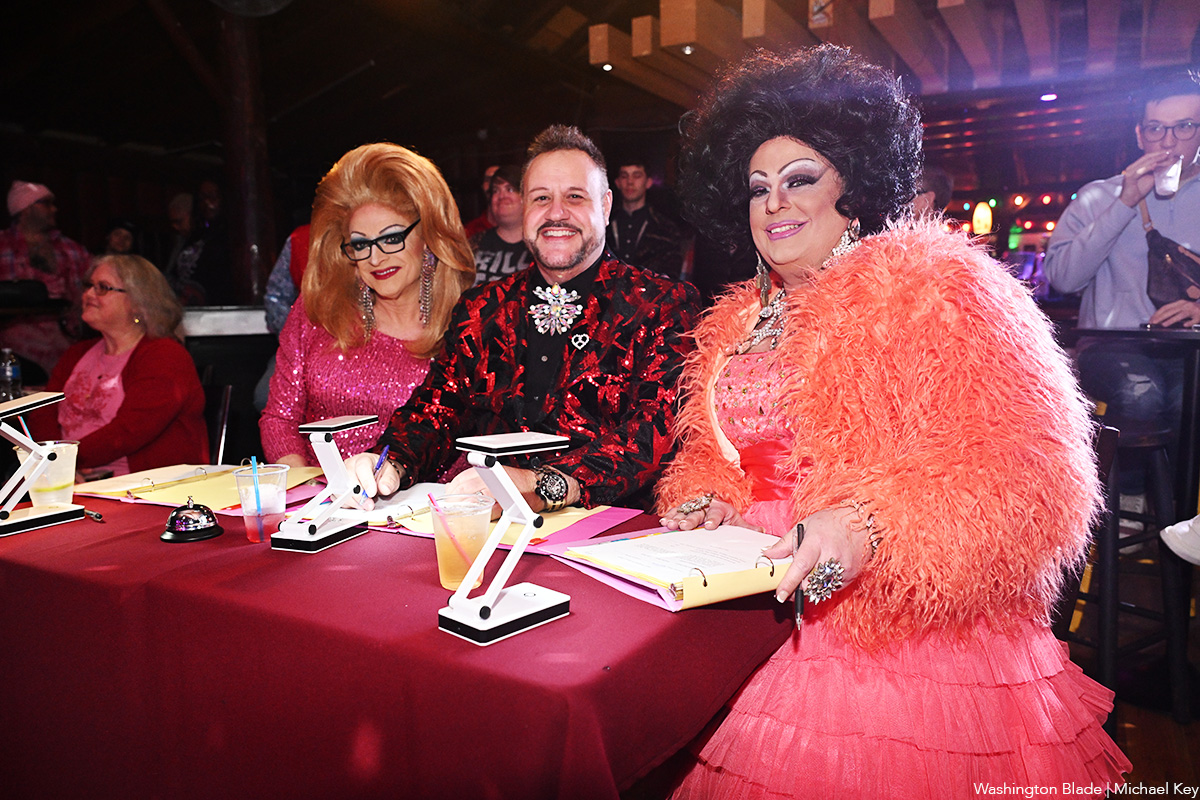
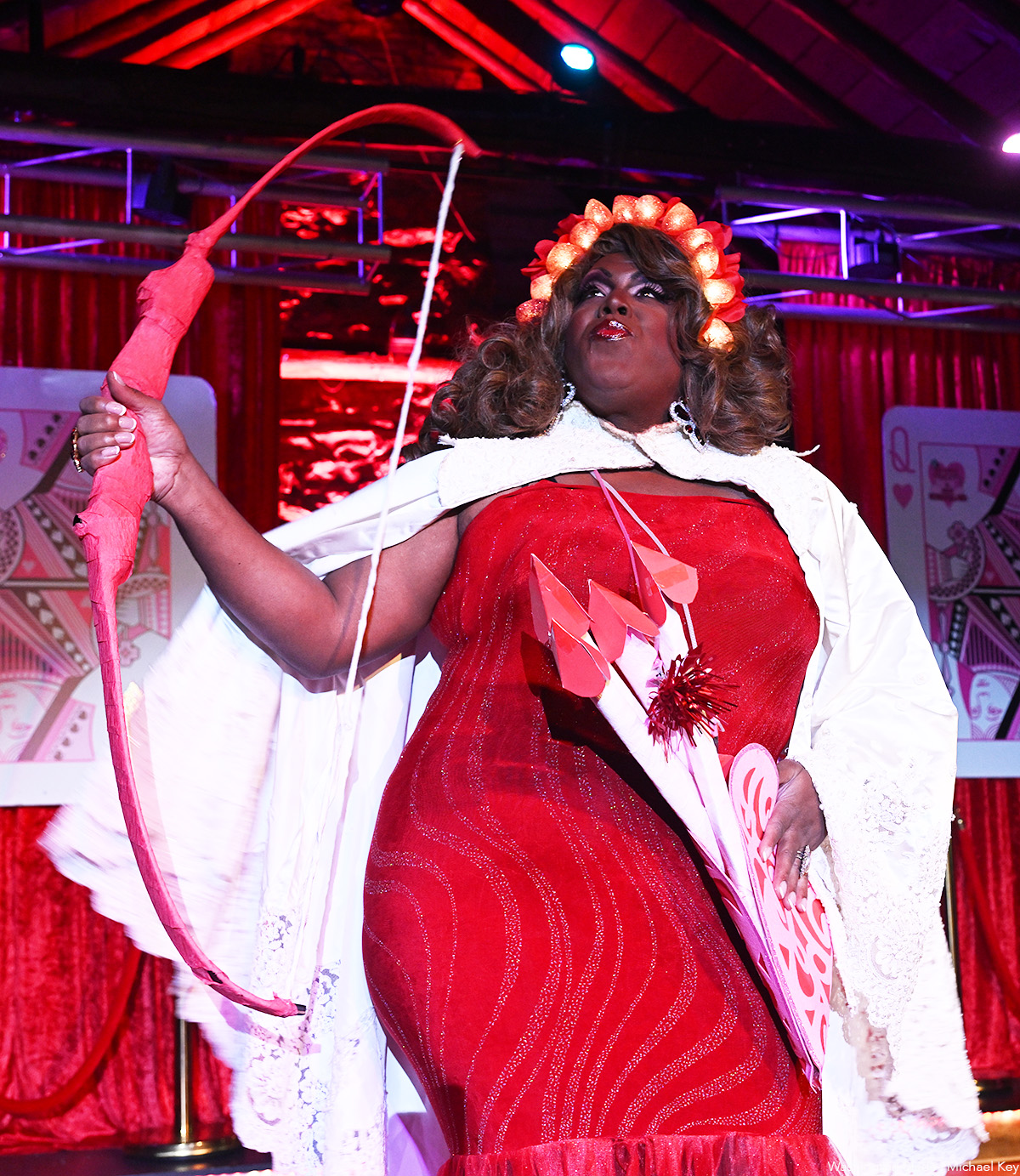
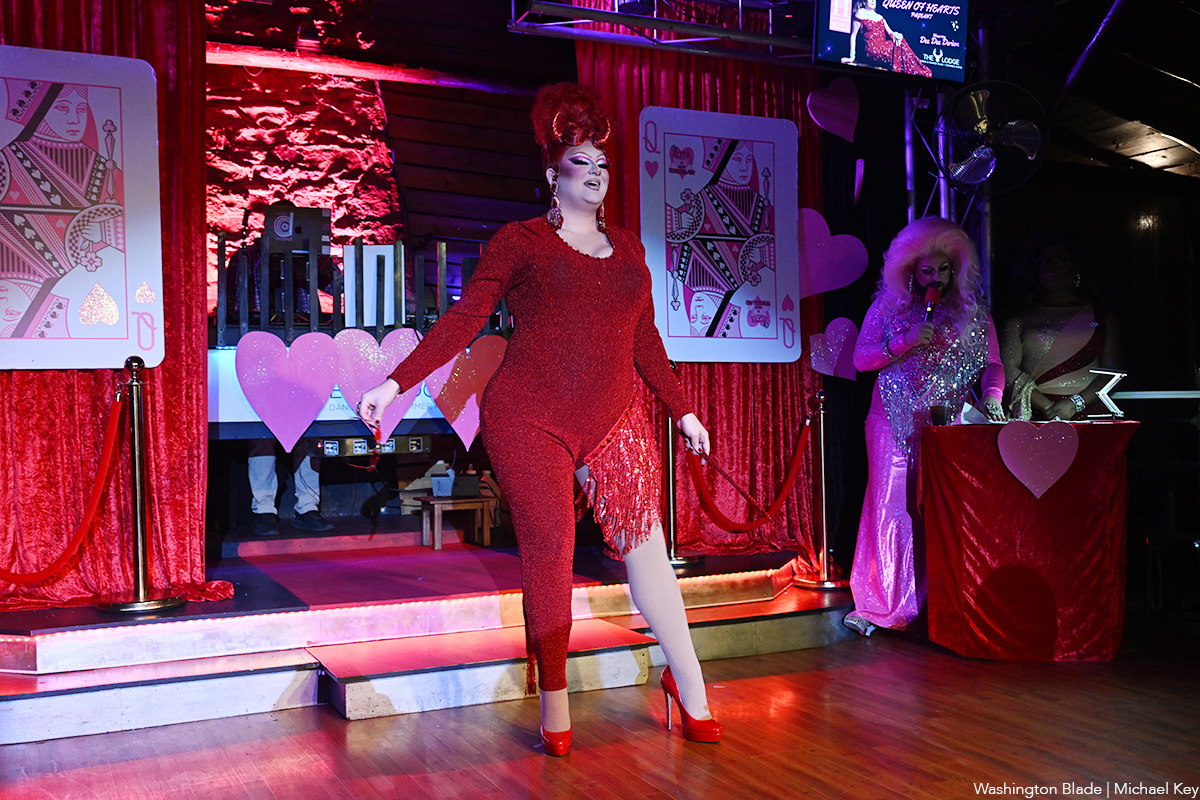
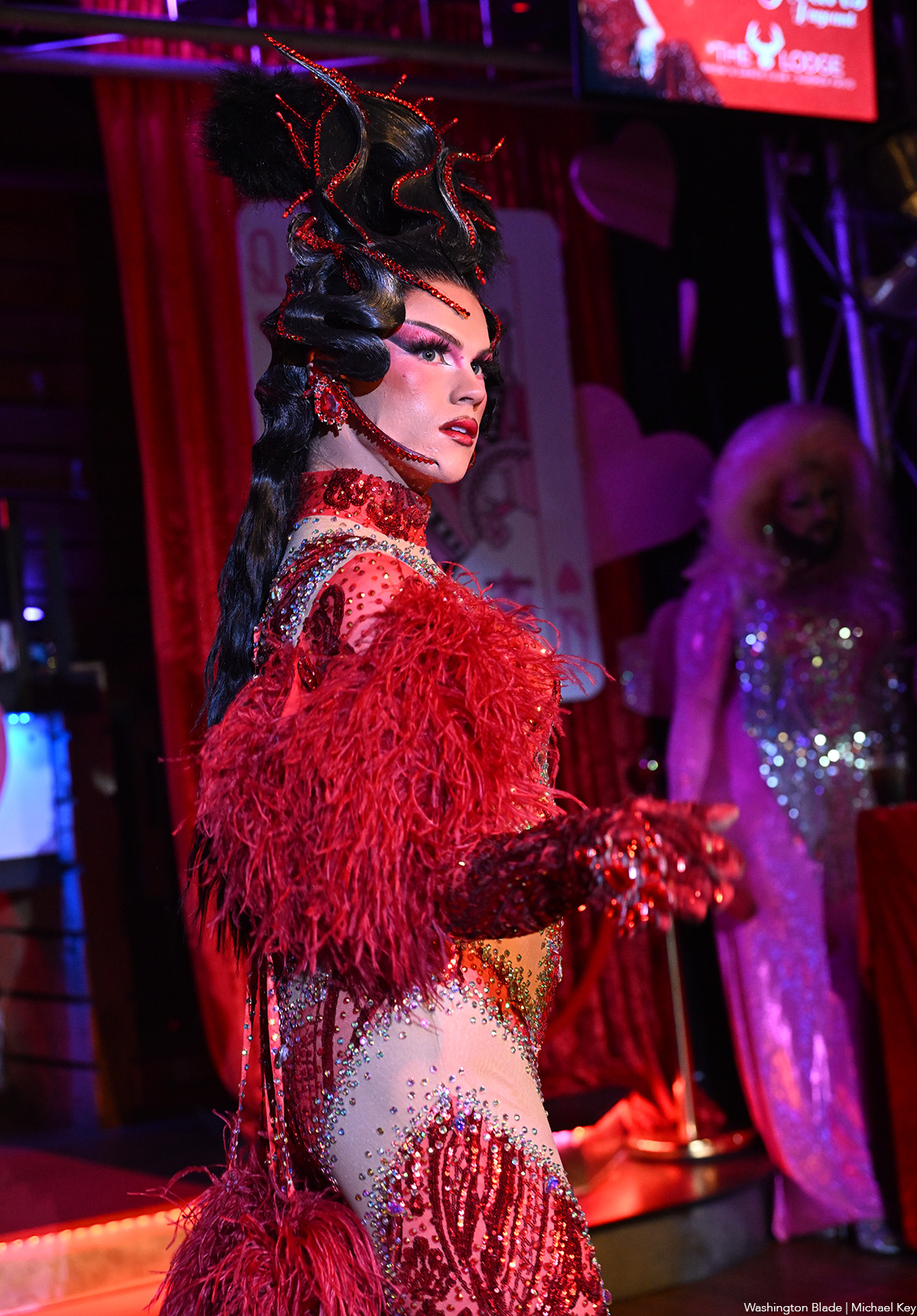
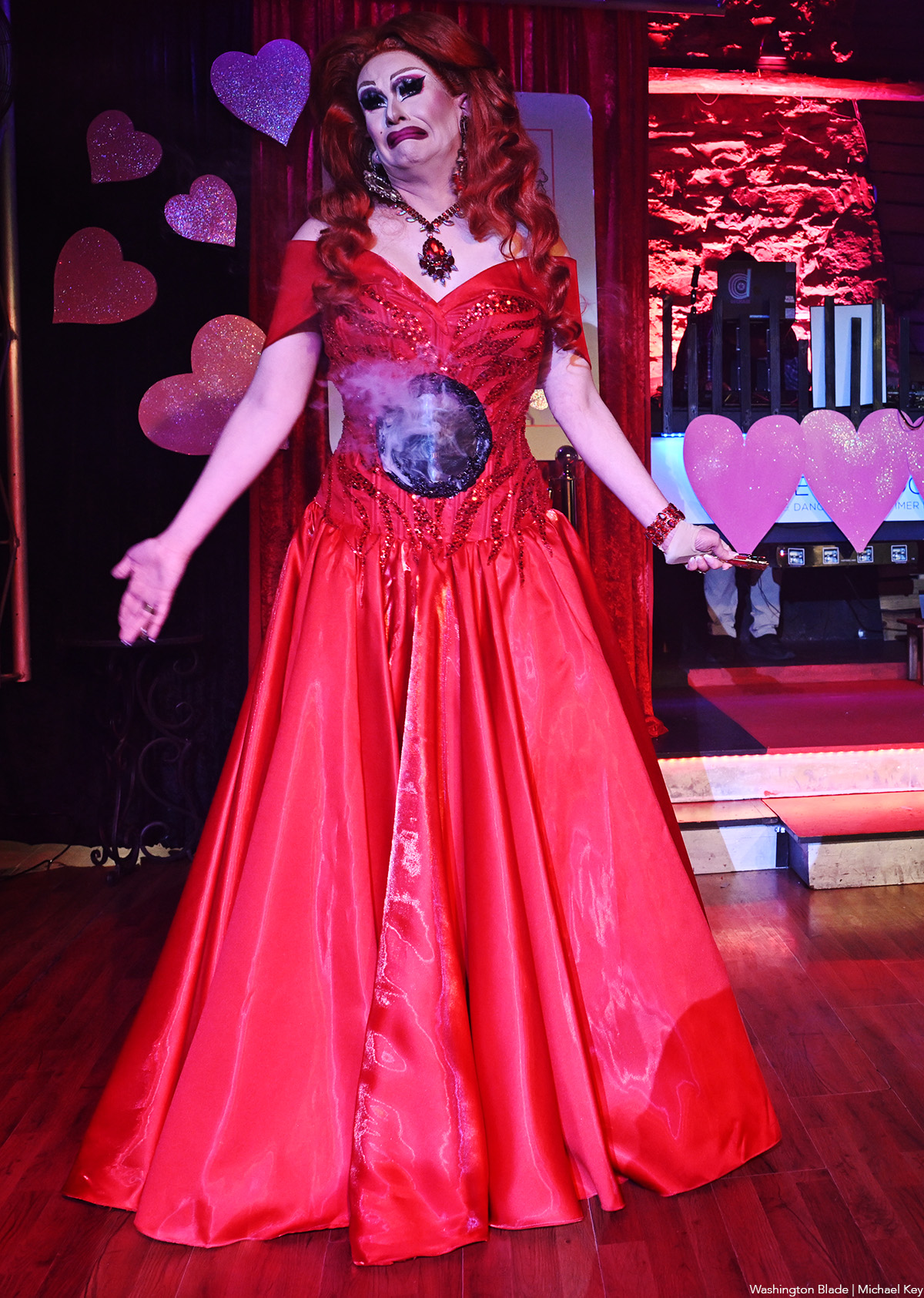
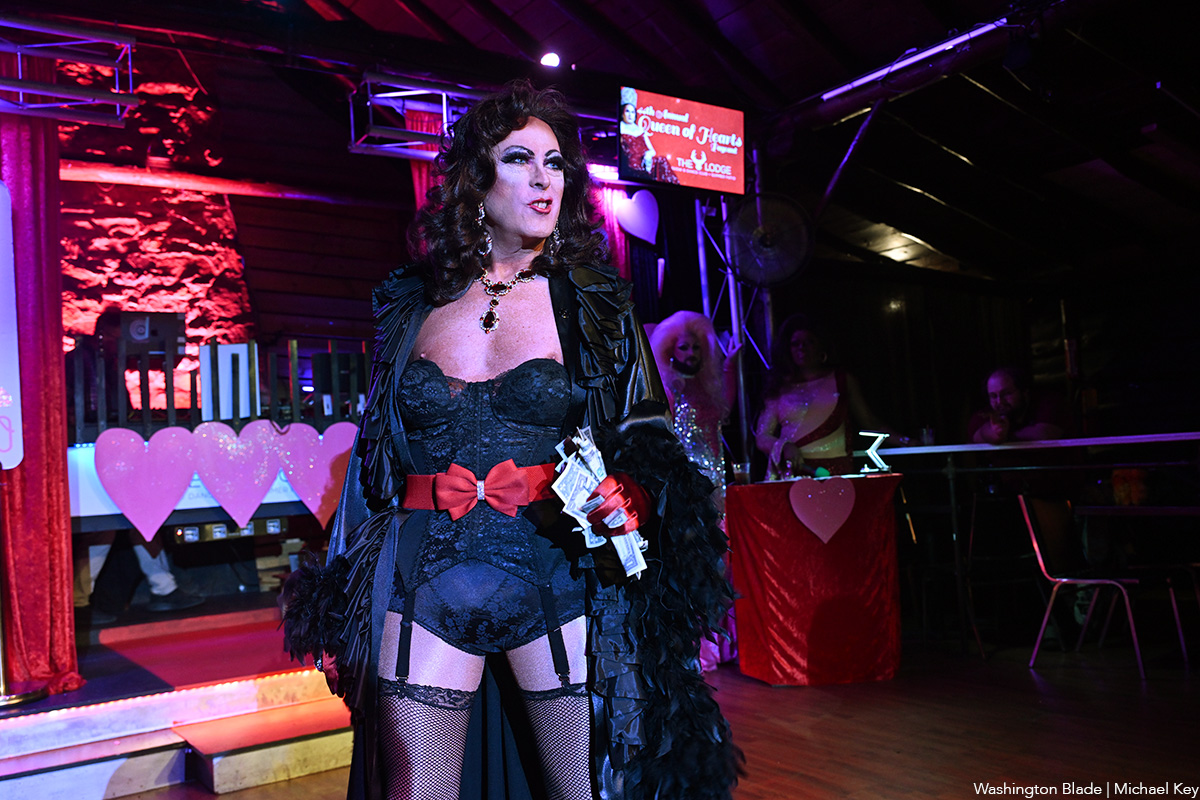
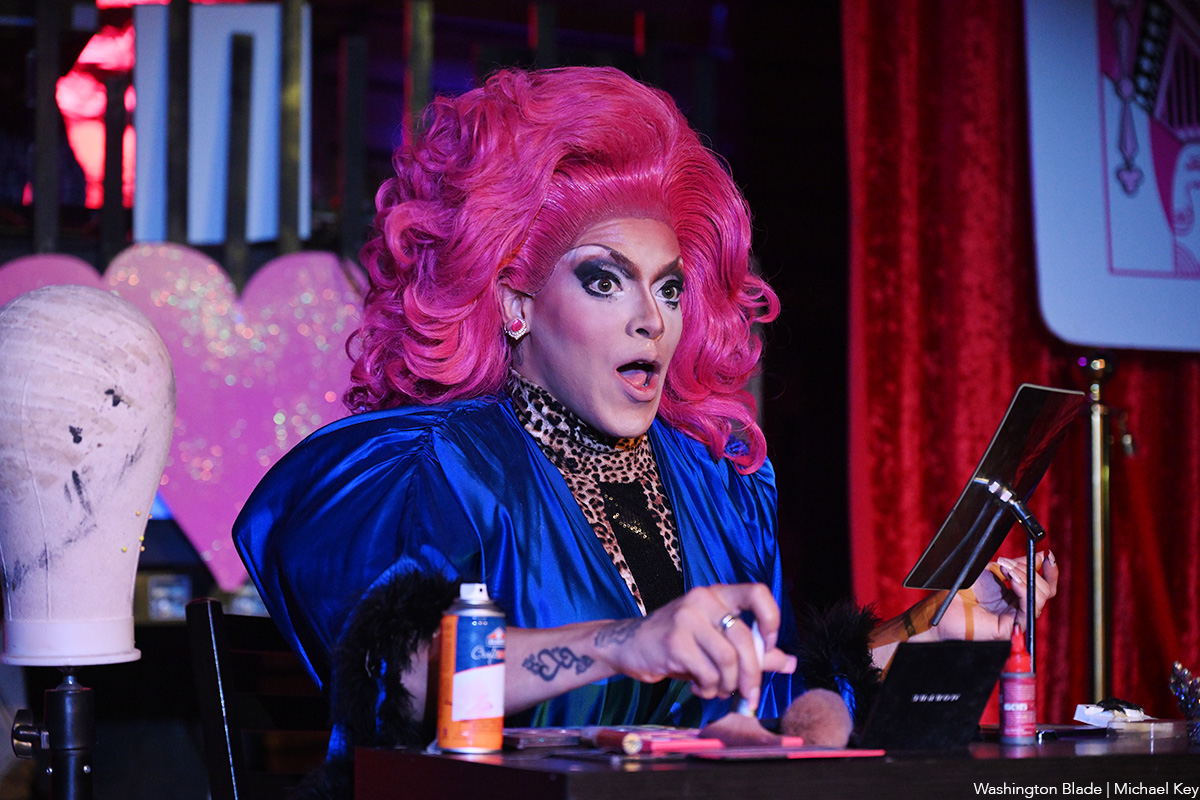
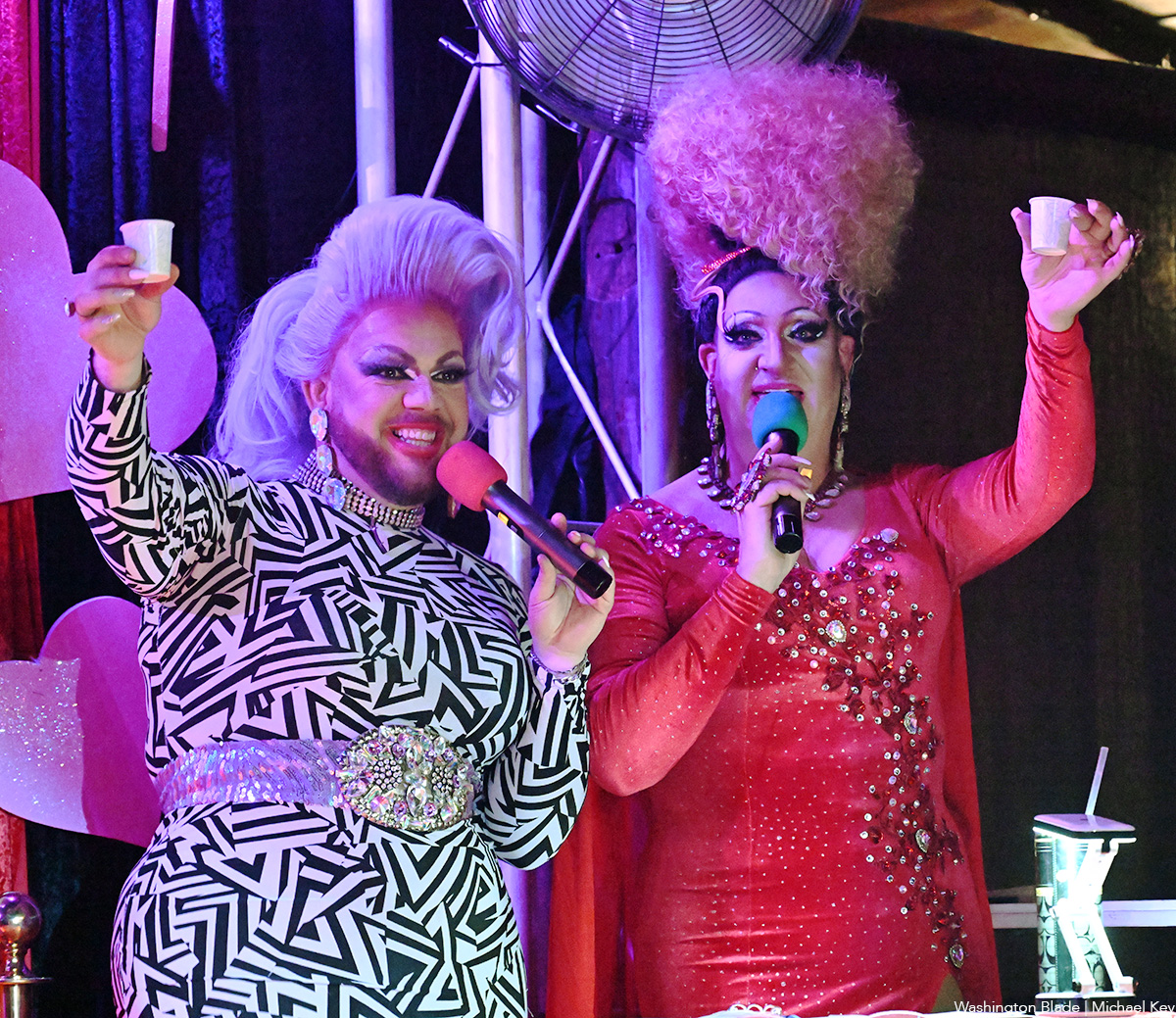
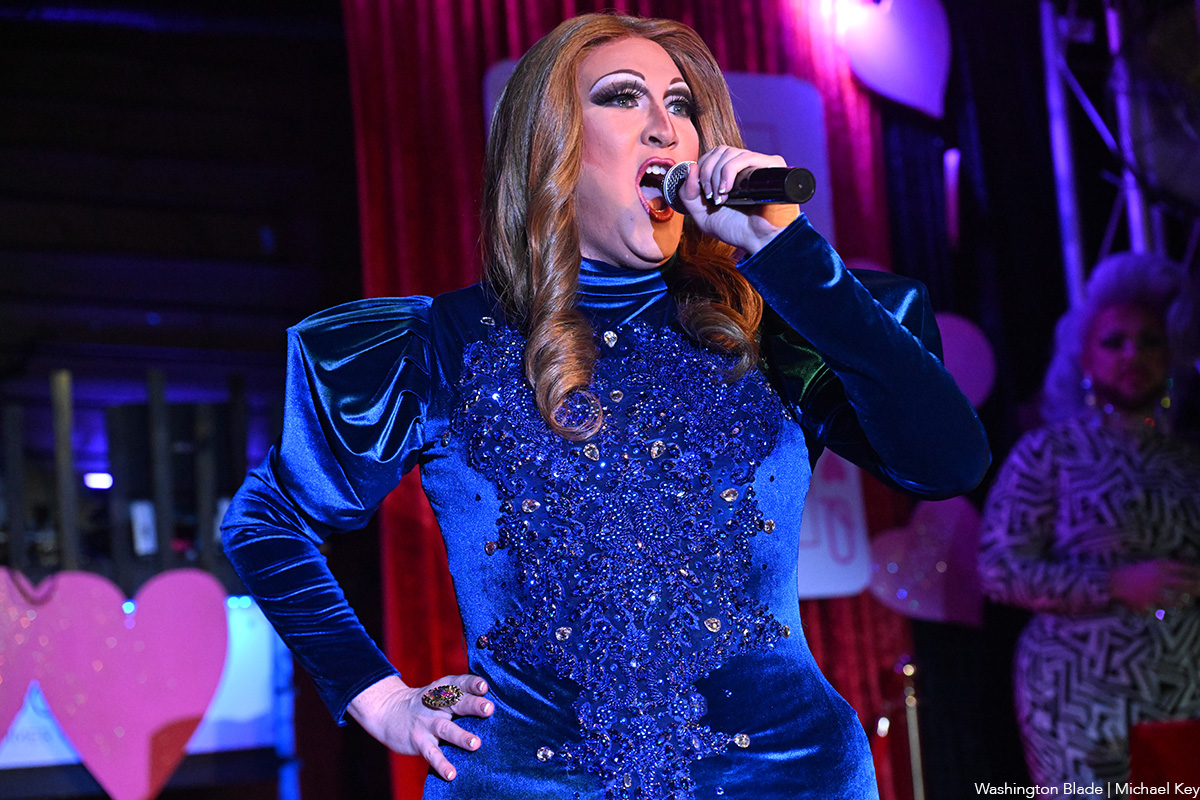
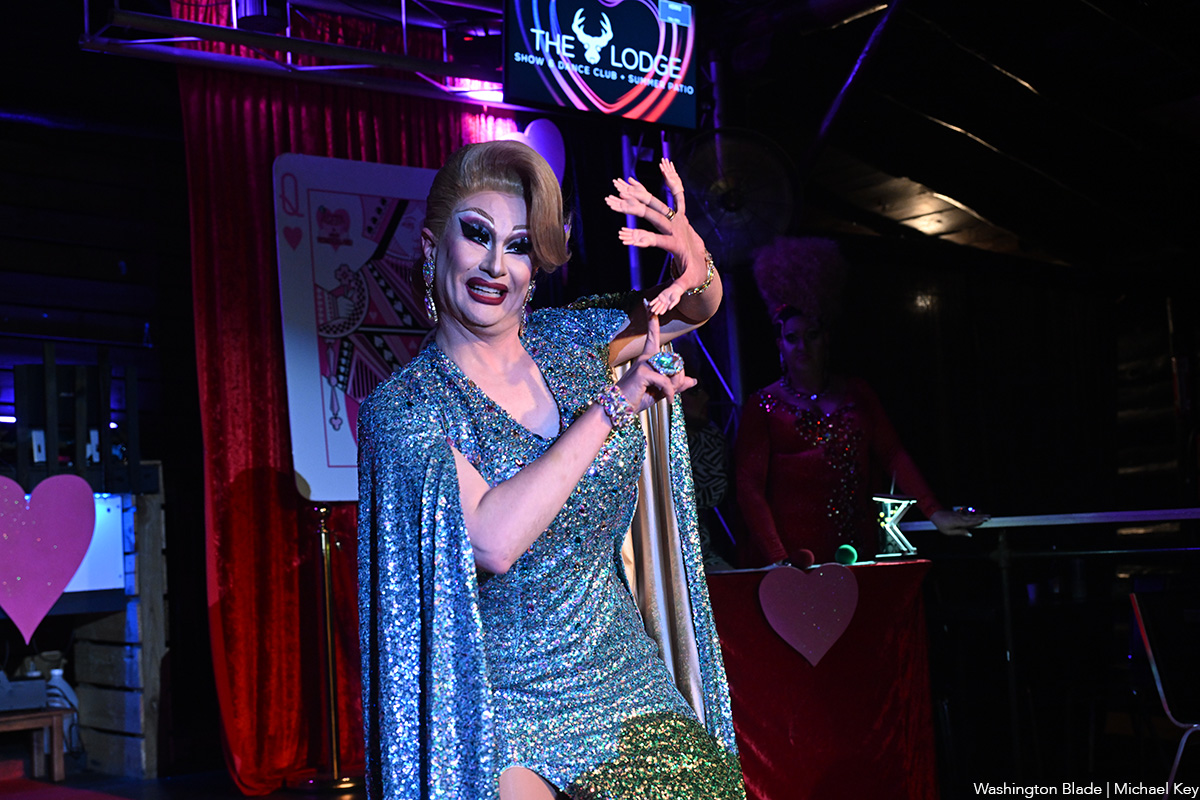
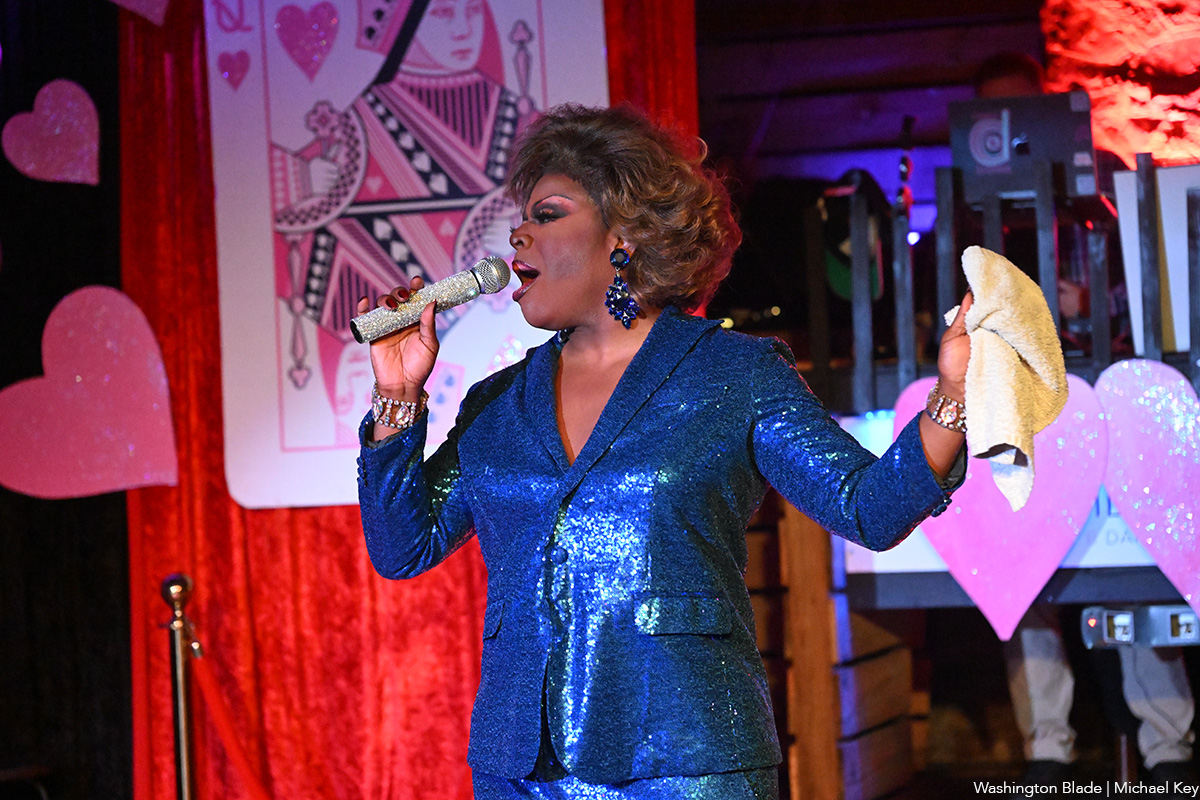
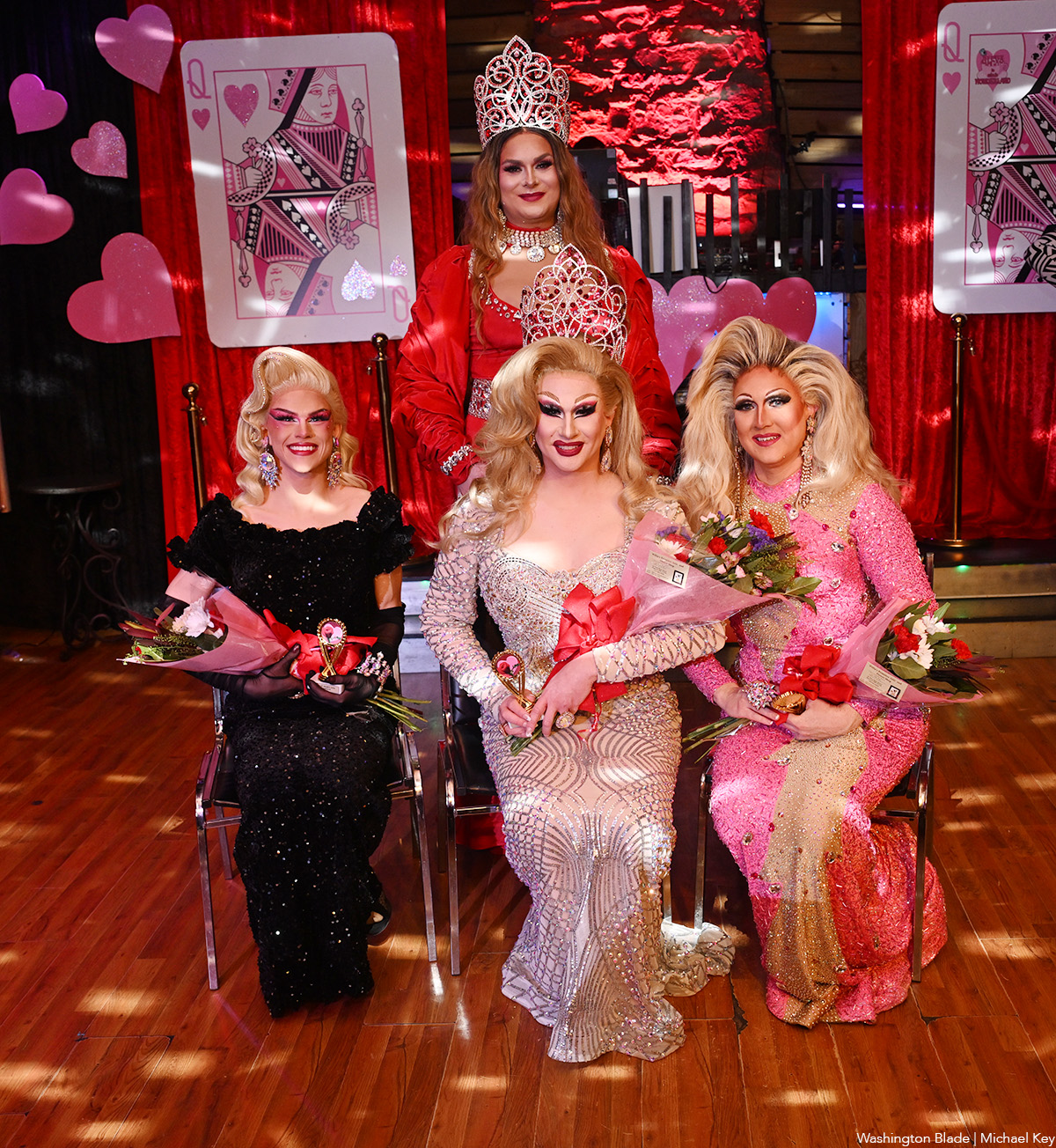
View on Threads
Books
New book profiles LGBTQ Ukrainians, documents war experiences
Tuesday marks four years since Russia attacked Ukraine

Journalist J. Lester Feder’s new book profiles LGBTQ Ukrainians and their experiences during Russia’s war against their country.
Feder for “The Queer Face of War: Portraits and Stories from Ukraine” interviewed and photographed LGBTQ Ukrainians in Kyiv, the country’s capital, and in other cities. They include Olena Hloba, the co-founder of Tergo, a support group for parents and friends of LGBTQ Ukrainians, who fled her home in the Kyiv suburb of Bucha shortly after Russia launched its war on Feb. 24, 2022.
Russian soldiers killed civilians as they withdrew from Bucha. Videos and photographs that emerged from the Kyiv suburb showed dead bodies with their hands tied behind their back and other signs of torture.

Olena Shevchenko, chair of Insight, a Ukrainian LGBTQ rights group, wrote the book’s forward.

The book also profiles Viktor Pylypenko, a gay man who the Ukrainian military assigned to the 72nd Mechanized Black Cossack Brigade after the war began. Feder writes Pylypenko’s unit “was deployed to some of the fiercest and most important battles of the war.”
“The brigade was pivotal to beating Russian forces back from Kyiv in their initial attempt to take the capital, helping them liberate territory near Kharkiv and defending the front lines in Donbas,” wrote Feder.
Pylypenko spent two years fighting “on Ukraine’s most dangerous battlefields, serving primarily as a medic.”
“At times he felt he was living in a horror movie, watching tank shells tear his fellow soldiers apart before his eyes,” wrote Feder. “He held many men as they took their final breaths. Of the roughly one hundred who entered the unit with him, only six remained when he was discharged in 2024. He didn’t leave by choice: he went home to take care of his father, who had suffered a stroke.”
Feder notes one of Pylypenko’s former commanders attacked him online when he came out. Pylypenko said another commander defended him.
Feder also profiled Diana and Oleksii Polukhin, two residents of Kherson, a port city in southern Ukraine that is near the mouth of the Dnieper River.
Ukrainian forces regained control of Kherson in November 2022, nine months after Russia occupied it.
Diana, a cigarette vender, and Polukhin told Feder that Russian forces demanded they disclose the names of other LGBTQ Ukrainians in Kherson. Russian forces also tortured Diana and Polukhin while in their custody.
Polukhim is the first LGBTQ victim of Russian persecution to report their case to Ukrainian prosecutors.

Feder, who is of Ukrainian descent, first visited Ukraine in 2013 when he wrote for BuzzFeed.
He was Outright International’s Senior Fellow for Emergency Research from 2021-2023. Feder last traveled to Ukraine in December 2024.
Feder spoke about his book at Politics and Prose at the Wharf in Southwest D.C. on Feb. 6. The Washington Blade spoke with Feder on Feb. 20.
Feder told the Blade he began to work on the book when he was at Outright International and working with humanitarian groups on how to better serve LGBTQ Ukrainians. Feder said military service requirements, a lack of access to hormone therapy and documents that accurately reflect a person’s gender identity and LGBTQ-friendly shelters are among the myriad challenges that LGBTQ Ukrainians have faced since the war began.
“All of these were components of a queer experience of war that was not well documented, and we had never seen in one place, especially with photos,” he told the Blade. “I felt really called to do that, not only because of what was happening in Ukraine, but also as a way to bring to the surface issues that we’d had seen in Iraq and Syria and Afghanistan.”

Feder also spoke with the Blade about the war’s geopolitical implications.
Russian President Vladimir Putin in 2013 signed a law that bans the “promotion of homosexuality” to minors.
The 2014 Winter Olympics took place in Sochi, a Russian resort city on the Black Sea. Russia annexed Crimea from Ukraine a few weeks after the games ended.
Russia’s anti-LGBTQ crackdown has continued over the last decade.
The Russian Supreme Court in 2023 ruled the “international LGBT movement” is an extremist organization and banned it. The Russian Justice Ministry last month designated ILGA World, a global LGBTQ and intersex rights group, as an “undesirable” organization.
Ukraine, meanwhile, has sought to align itself with Europe.
Ukrainian President Volodymyr Zelenskyy after a 2021 meeting with then-President Joe Biden at the White House said his country would continue to fight discrimination based on sexual orientation and gender identity. (Zelenskyy’s relationship with the U.S. has grown more tense since the Trump-Vance administration took office.) Zelenskyy in 2022 publicly backed civil partnerships for same-sex couples.
Then-Ukrainian Ambassador to the U.S. Oksana Markarova in 2023 applauded Kyiv Pride and other LGBTQ and intersex rights groups in her country when she spoke at a photo exhibit at Ukraine House in D.C. that highlighted LGBTQ and intersex soldiers. Then-Kyiv Pride Executive Director Lenny Emson, who Feder profiles in his book, was among those who attended the event.
“Thank you for everything you do in Kyiv, and thank you for everything that you do in order to fight the discrimination that still is somewhere in Ukraine,” said Markarova. “Not everything is perfect yet, but you know, I think we are moving in the right direction. And we together will not only fight the external enemy, but also will see equality.”
Feder in response to the Blade’s question about why he decided to write his book said he “didn’t feel” the “significance of Russia’s war against Ukraine” for LGBTQ people around the world “was fully understood.”
“This was an opportunity to tell that big story,” he said.
“The crackdown on LGBT rights inside Russia was essentially a laboratory for a strategy of attacking democratic values by attacking queer rights and it was one as Ukraine was getting closet to Europe back in 2013, 2014,” he added. “It was a strategy they were using as part of their foreign policy, and it was one they were using not only in Ukraine over the past decade, but around the world.”
Feder said Republicans are using “that same strategy to attack queer people, to attack democracy itself.”
“I felt like it was important that Americans understand that history,” he said.

More than a dozen LGBTQ athletes won medals at the Milan Cortina Winter Olympics that ended on Sunday.
Cayla Barnes, Hilary Knight, and Alex Carpenter are LGBTQ members of the U.S. women’s hockey team that won a gold medal after they defeated Canada in overtime. Knight the day before the Feb. 19 match proposed to her girlfriend, Brittany Bowe, an Olympic speed skater.
French ice dancer Guillaume Cizeron, who is gay, and his partner Laurence Fournier Beaudry won gold. American alpine skier Breezy Johnson, who is bisexual, won gold in the women’s downhill. Amber Glenn, who identifies as bisexual and pansexual, was part of the American figure skating team that won gold in the team event.
Swiss freestyle skier Mathilde Gremaud, who is in a relationship with Vali Höll, an Austrian mountain biker, won gold in women’s freeski slopestyle.
Bruce Mouat, who is the captain of the British curling team that won a silver medal, is gay. Six members of the Canadian women’s hockey team — Emily Clark, Erin Ambrose, Emerance Maschmeyer, Brianne Jenner, Laura Stacey, and Marie-Philip Poulin — that won silver are LGBTQ.
Swedish freestyle skier Sandra Naeslund, who is a lesbian, won a bronze medal in ski cross.
Belgian speed skater Tineke den Dulk, who is bisexual, was part of her country’s mixed 2000-meter relay that won bronze. Canadian ice dancer Paul Poirier, who is gay, and his partner, Piper Gilles, won bronze.
Laura Zimmermann, who is queer, is a member of the Swiss women’s hockey team that won bronze when they defeated Sweden.
Outsports.com notes all of the LGBTQ Olympians who competed at the games and who medaled.



